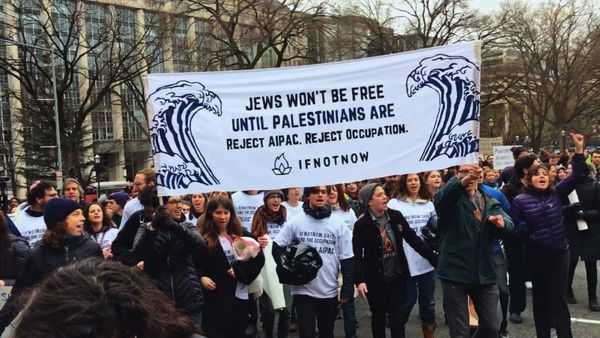Eye For Film >> Movies >> Israelism (2023) Film Review
Israelism
Reviewed by: Jennie Kermode

If a solution to the conflicts in the Middle East must ultimately lie in improved intercultural understanding, there are two areas outside the region where that also needs to happen. One is the US Jewish community, Israel’s primary defender on the world stage, and a powerful one. The other is the wider world, where understanding of the Palestinian struggle is generally more advanced, but where understanding of the cultural experience of being a US Jewish person is not. This documentary sets out to address both these areas.
The film has, of course, been challenged by pro-Israel members of the Jewish community. Some of these critiques are themselves rather revealing. For fairness’ sake I should state at the outset that I am not Jewish, American or Palestinian, but that I have interviewed people with diverse perspectives on the conflict. I have met young US-educated Jewish people who had been raised just like those this film describes. I’m sure that there are exceptions to that rule, but it doesn’t have to apply universally in order to have a significant impact on geopolitics, and whilst there are aspects of the Zionist project that the film doesn’t address, it’s fairly well borne out by evidence insofar as it goes.

Most people struggle to empathise when issues are discussed on a geopolitical scale. Directors Erin Axelman and Sam Eilertsen recognise the value of focusing on the personal. Early on, one Palestinian man reflects on his experience of visiting the US and being told by various people that they liked him but hated Palestinians as a whole. That’s a common way for people to handle disconnects with their racist beliefs, and always uncomfortable, to say the least, but he states that he quickly came to realise they were speaking from a position of ignorance. To them, the word ‘Palestinian’ was synonymous with ‘terrorist’. How did that come to be?
There are wider questions one might ask here about the US education system, its broader weakness when it comes to informing young people about the world beyond their national borders, and it inability to ensure basic standards of knowledge amongst those educated at home or within culturally distinct schooling projects, but these are largely beyond the scope of the film. What it does look at is how easy it is, as a Jewish American child, to grow up within a cultural bubble. “Israel was just treated like a core part of being a Jew,” says Simone Zimmerman, reflecting on her schooling. A teacher says that for her, the two can’t be separated. A young man, Eitan, remembers a similar environment, including a big focus on going to visit Israel. Not Palestine, of course. Zimmerman remembers all her friends telling her that she’d be raped and murdered if she went there.
Most US Jewish people have friends or family members in Israel. It may be five and a half thousand miles away but it feels like it’s just next door. When people pour out into the streets waving flags in a Celebrate Israel parade in New York, it’s a personal issue for them – and yet at the distance, it’s easy to miss things. What do we know about Israeli soldiers? They’re “brave” and “really cool,” some of the young people say, as if those were terms that could be applied with confidence to any group en masse. “They’re hot,” says another. These kids are encouraged to join the IDF or to become advocates for Israel at home. That’s not an assumption on the part of the filmmakers – we hear it directly from some of those doing the encouraging.
In Palestine, one man remembers his first encounter with IDF soldiers as a child, his fear when they threatened his father. There is talk of the absurdity of US teenagers going there “wanting to play cowboys and indians” and claiming that it’s rightfully their land.
Why do they think that? We hear about the ‘empty wasteland’ story – the idea that Israel was just an empty desert until Jewish people went there and built such a nice country that jealous Arabs moved into the region to attack them. Absurd though this sounds to anyone with a basic knowledge of early human history or geography, it’s easy enough to instil in kids if they’re discouraged from questioning it – say it often enough and it comes to be taken for granted. Then there’s the general absence of any education about who the Palestinians are – like Philistines in the Bible, they simply become generic bad guys, and it doesn’t occur to people to wonder about their motivation.
How does one break through this kind of conditioning? Not from the outside, that’s for sure. The attitudes of young US Jewish people are changing, but they’re doing so thanks to the efforts of those of their peers who have seen what’s happening in Palestine for themselves. Around a third of this film serves as a platform for such messages, and this may be of less interest to viewers from outside the community, as it is, to most of the world, fairly familiar stuff. It’s supported by footage, reducing the risk that it will be rejected out of hand, and indeed, those decrying the film have not done so, arguing instead that there is a lack of context. Again, I am an outsider, but in light of the prevailing social views to which the target audience is exposed, such context seems no more necessary to me than a potted lesson about the existence of heterosexuality at the start of every LGBTQ+ film.
There is an effort, nonetheless, to offer a right of reply to those whose strategy is criticised. This includes an interview with Abe Foxman of the Anti-Defamation League, who says of those who favour Palestinian rights “I think they’re a little super naïve.” It would have been nice to hear his reasons for this – it’s not clear if he gave none or if they simply weren’t included. There is also sympathy expressed for some such thinkers, in the form of discussion about the effects of generational trauma, though this is a concept which many viewers will be unfamiliar with, and it could do with a bit more explanation.
Though it touches only very briefly on the current violence in Gaza – one suspects that it was well into post-production when that began – Israelism is a timely and very necessary film, encouraging viewers to look at the situation as it stands without apportioning blame, and to focus on solutions. It is at its bleakest when addressing the very real dangers that Jewish people in the US (and around the world) face at the moment, observing how many have been politically manipulated into supporting right wing movements which represent a real existential threat. It might have been useful to reflect briefly on the right wing Christian evangelical position on Israel here, but Axelman and Eilertsen still deliver plenty for viewers to chew on. Perhaps most impressively, they manage to end on a positive note. Change is happening. For those at the sharp end, it cannot happen soon enough.
Reviewed on: 09 Jun 2024















